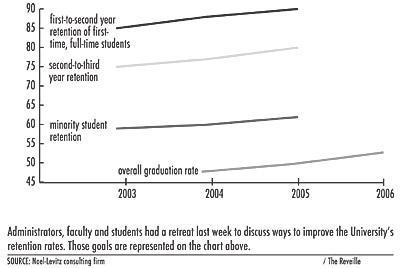University officials are trying to find solutions to increase student retention rates in an effort to boost the Flagship Agenda.
A broad cross-section of more than 40 students, faculty and administrators participated in a half-day retreat last week to target problems and come up with solutions to improve University student enrollment and retention.
The administration hired consultant firm Noel-Levitz to help manage enrollment problems and build strategies based on participant findings, said Assistant Vice Chancellor of Academic Affairs Karen Denby.
“The retention project is being started to reach the goal of a 90 percent first- to second-year retention rate and increasing the graduation rate,” said Jim Hundrieser, the associate vice president of Retention Services for Noel-Levitz.
During the retreat, participants discussed problems facing the University and ways to improve retention rates.
Denby said an assigned committee will review the outcome of the retreat to produce concrete long-term strategies.
According to Hundrieser’s report, the University hopes to increase the six-year graduation rate from 56.7 percent to 59 percent by 2004 and further increase it during following years.
Hundrieser said the goal is challenging because very few universities achieve such a retention rate.
Sandy Walker, director of Budget and Planning, told The Reveille in a previous article that in 1998 only 24 percent of students graduated in four years.
Denby also told The Reveille that student retention is not a new problem for the University, and administrators continually search for ways to remedy the problem.
Mary Feduccia, director of Career Services and a participant in the retreat, said the University accepts students with the expectation that they will graduate.
If the retention rate is low, the University is not achieving its ultimate goal, Feduccia said.
“Retention rates have increased over past years, and the University has set goals to be more aggressive so a greater number of students will be retained,” she said.
Hundrieser agreed the University is improving and becoming a top-notch institution.
“Currently LSU has a very good graduation and retention rate, but to set these ambitious goals, the administration is demonstrating its commitment to making LSU even better,” Hundrieser said.
Associate Vice Chancellor and University College Dean Carolyn Collins said LSU’s freshmen retention rate is 84.5 percent compared to the national average of 70 percent.
The University’s high retention rate sets it apart from the generally low retention rates of other universities in the state, she said.
Collins said most of the problems pertained to retention of students during freshman and sophomore year because most students that do leave the University do so during this period.
Retreat participants suggested implementing a program to recruit students who leave and also set up exit interviews with those students who plan to leave, according to Hundrieser’s retreat report.
The retreat report also outlined strategies to deal with second year students, minority students and the overall graduation rate.
Collins said students who become more involved on campus are more easily retained.
“We are interested in getting students involved in university life early on,” Collins said. “Many students may not be interested in joining a fraternity or sorority, but they have other interests. We want to make sure the students have many options to choose from.”
Because student retention involves so many factors, the retention plan is expected to stretch over several years, Collins said.
“We’re looking at a very broad range of solutions, but they are all very significant,” she said.
Denby said administrators plan to meet with Hundrieser again in late February to continue discussing the retention plan.
Officials plan to improve student retention
February 10, 2003

Officials plan to improve student retention





